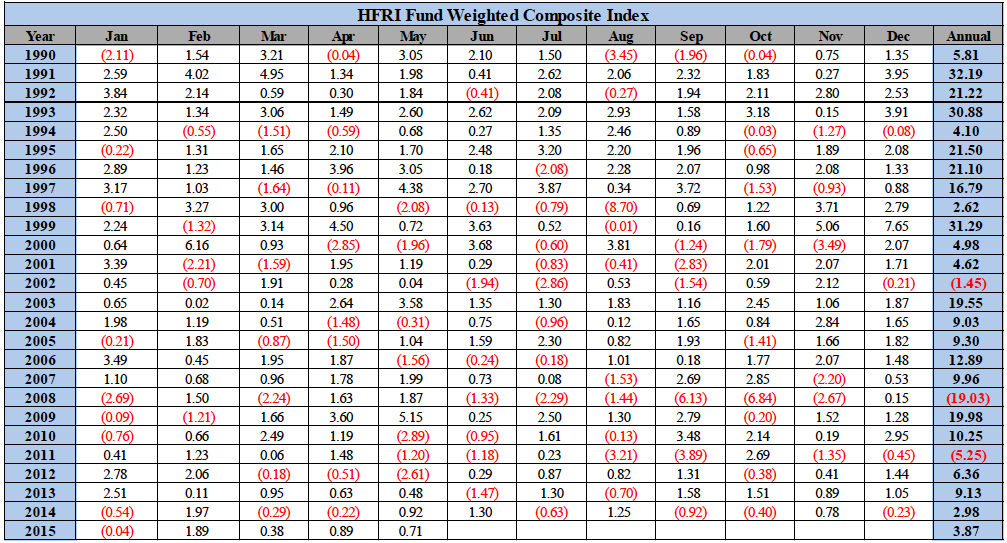I hope you didn’t just commit money to a hedge fund.
Over the last 25 years, hedge funds have made their worst average monthly return in June, according to data from Hedge Fund Review (HFR).
June has also been one of the most frequent months to end on a sour note, as upon eight out of 25 occasions, these funds have lost investor money.
Since 1990, June has boasted 17 years of positive performance across the hedge fund spectrum. But in these 17 years, it has produced a mean 1.44% return—the lowest of all calendar months.
Just ahead of June, August has produced marginally better results, with a mean 1.58% earned in positive years. However, if you’re feeling like playing Russian Roulette with your returns, August and October have historically been the least likely to produce a positive result, HFR’s data shows. On just 14 occasions out of 25 have these months offered a positive return on average, at 1.5% and 1.8% respectively.
The highest average return has occurred in January, with earning months producing 2.17%. But you would have had to have avoided one of the eight years when this month ended in the red over the past quarter century.
The best month to be in hedge funds has been December, the data shows. On 21 occasions, the celebratory time of the year for many has extended its glad tidings to hedge fund investors. February comes close with 20 positive outcomes, then November with 19. December has also carried with it the second-best average monthly return—2.11%—while February languishes on an average just 1.63% and November on 1.67%.
So what makes December so special?
“There are a few competing explanations for the ‘December effect’ in hedge fund returns,” says Matthew Towsey, hedge fund specialist at Aon Hewitt. “One is that hedge fund performance fees are often based on performance in a calendar year. This may lead to some funds chasing performance in December to earn a performance fee for the year.”
That hedge funds either hit a high return or crash in January could give credence to this thesis, as positions either continue on their stellar trajectory—or run out of track.
Peter Drewienkiewicz, head of manager research at Redington, has another idea. He says active managers tend to take less risk in December, which leads not only to less volatility, but also a higher median return.
Story continues…
“What we tend to expect from December is less volatility and potentially some convergence, as people try to mark their books for year end at sensible levels and it appears that this may benefit ‘hedged’ strategies,” says Drewienkiewicz.
A glance at the VIX index over the 25-year period shows volatility appears to be at marginally lower levels in December than at other times of the year. Religious and national holidays—along with bottles of eggnog or equivalents—may well have a part to play in this.
“Stock markets tend to rise in December as investors tend to defer selling stocks until the New Year,” says Towsey. “Hence there are generally fewer sellers and more buyers in December. Many hedge funds have high correlation to the equity markets, so also see a boost to returns in December.”
Indeed the best monthly return over the 25-year dataset occurred in December 1999. The average hedge fund investor would have seen a 7.76% uptick on their portfolio during that month. After taking a relative bath in January (0.64%), performance in February 2000 swung back up to the second highest result in the time frame (6.16%), ensuring the year’s shortest month vied for the most consistent positive return title.
Upon 15 occasions, returns in December were higher than those made in November, HFR data shows—often significantly so.
Along with being the most consistently positive, December also tied for the fewest positive sub-1% returns over the 25 years. Rather than just scraping into positive territory, on only three occasions did the average hedge fund make less than a 1% return for its investors when on the right side of the line. October was the only other month to boast this track record, but with a much less-assured chance of investors falling on a positive year.
However, before we get too carried away with the most wonderful time of the year, Towsey voices an altogether less cheerful prospect for investors as to why December may be the best.
“A possible explanation is that many hedge funds did not always have independent administrators and may have engaged in ‘smoothing’ returns,” he says. “This is a practice where the fund may look to eliminate some volatility in reported returns. There may have been a benefit in reporting a strong December to maximise the fee income for the year. It should be noted that this practice was anecdotally more prevalent in the earlier days of hedge funds and is why at Aon we need hedge funds that we recommend to have an independent administrator.”
CIO is sure all hedge funds worth their salt in 2015 now have one.
So we return to the mathematical, financial, or economic reasons why December should be a standout month for hedge funds.
“I would be interested in analysing this next to the data for individual risk assets,” says Drewienkiewicz at Redington, “to see how much of the positive effect is explained by simple risk-on moves towards the end of the year.”
CIO would be interested too—it might just be an anomaly. Would someone like to dig a little deeper and let us know? And please, don’t make us wait until Christmas to find out.
 Source: HFR
Source: HFR
Related:Hedge Funds Beat 2014 Returns… Already & Why Your (Smaller) HF Manager Might Not Be Worth the Fees

